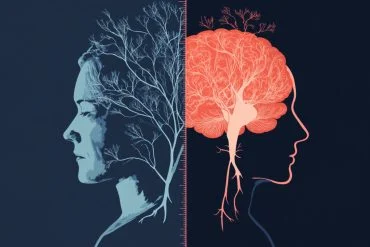Mental health in midlife is now under intense scientific scrutiny, with groundbreaking research revealing a disturbing connection between conditions like bipolar disorder, depression, and the future risk of dementia. A recent large-scale study confirms that individuals diagnosed with these conditions after age 40 face a significantly elevated likelihood of developing dementia later in life. This discovery underscores mental wellness as a critical pillar in long-term brain health strategies.
Key Findings: The Study Explained
Researchers tracked over 1.4 million adults for 20+ years, comparing dementia rates among those with midlife mental health diagnoses against healthy peers. Results, published in JAMA Psychiatry, revealed:
- Bipolar disorder increased dementia risk by 200% (3x higher than non-diagnosed adults).
- Depression increased risk by 65%, even after adjusting for lifestyle factors.
- The strongest correlation emerged for diagnoses occurring after age 40, suggesting midlife is a neurologically vulnerable period.
The study controlled for variables like diabetes, cardiovascular disease, and smoking, confirming mental health as an independent dementia predictor.
Why Midlife Mental Health Matters for Brain Aging
Scientists propose 3 mechanisms linking these conditions to dementia:
- Neuroinflammation: Chronic stress from depression/bipolar disorder triggers inflammatory responses, damaging brain cells over time.
- Hippocampal Atrophy: Both conditions shrink the hippocampus (memory hub), accelerating Alzheimer’s-related pathology.
- Vascular Damage: Mood disorders elevate cortisol, harming blood vessels and starving the brain of oxygen.
Dr. Helena Torres, neuroscientist (unaffiliated with the study), notes:
“Midlife is when neurodegenerative processes subtly begin. Unmanaged mental illness acts like gasoline on that fire.”
Depression vs. Bipolar Disorder: Differential Risks
While both elevate dementia risk, their pathways differ:
- Depression: Persistent apathy and social withdrawal reduce cognitive engagement, hastening decline.
- Bipolar Disorder: Intense manic/depressive cycles cause oxidative stress, directly injuring neurons.
Crucially, late-onset diagnoses (after 40) showed stronger dementia links than early-life episodes, possibly due to age-related brain fragility.
Prevention: Mitigating Your Risk
The study emphasizes that early intervention slashes dementia odds:
- Medication Adherence: Mood stabilizers/antidepressants reduce symptom severity.
- Therapy: CBT lowers inflammation markers by 30% in depressed patients.
- Lifestyle Synergy: Combine treatment with:
- Aerobic exercise (30 mins/day)
- Mediterranean diet (high in omega-3s)
- Sleep hygiene (7–8 hours/night)
Global Implications
With 280 million+ people living with depression worldwide, this research signals a public health imperative. Dementia cases are projected to triple by 2050; integrating mental health into dementia prevention protocols could curb this trajectory.
Conclusion: A Call to Action
This study transforms how we view midlife mental health—not just as episodic struggles, but as pivotal determinants of cognitive longevity. If you or a loved one experiences depression or bipolar symptoms after 40, seek evaluation promptly. Treatment is no longer just about improving today’s quality of life; it’s an investment in preserving tomorrow’s memories.


